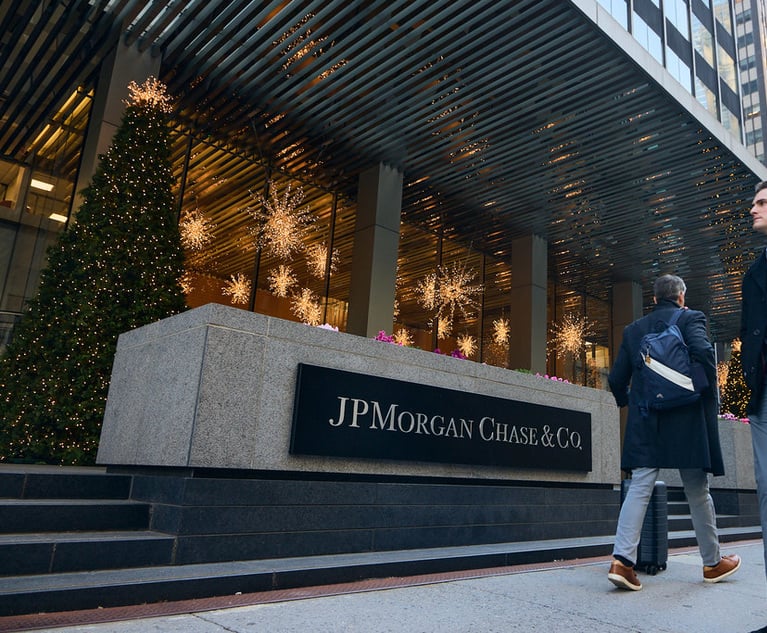SPACs: Great for Celebrities, But What About Dissenting Shareholders?
The day of reckoning may finally be upon Wall Street's long-running reality show. The overlooked concerns and drowned-out voices of the dissenting shareholders are now being heard and, in response, SPACs have been forced to become more transparent and accountable.
October 15, 2021 at 02:10 PM
10 minute read
 The M&A landscape has drastically changed in the last few years as waves of investors have rushed to join the trend of setting up Special Purpose Acquisition Companies (SPACs) as a seemingly more appealing way to take a company public than a traditional IPO. However, while the recent SPAC boom can be largely attributed to the promise of a speedy and efficient path to a public market, investors, spurred by recent guidance and statements from the S.E.C., are increasingly crying halt. Minority shareholders in particular are alleging in a spate of suits that they are victim of inequities in the SPAC process. This article discusses the tactics that dissenting shareholders can deploy to redress the heavy-handed tactics of majority shareholders and SPAC management.
The M&A landscape has drastically changed in the last few years as waves of investors have rushed to join the trend of setting up Special Purpose Acquisition Companies (SPACs) as a seemingly more appealing way to take a company public than a traditional IPO. However, while the recent SPAC boom can be largely attributed to the promise of a speedy and efficient path to a public market, investors, spurred by recent guidance and statements from the S.E.C., are increasingly crying halt. Minority shareholders in particular are alleging in a spate of suits that they are victim of inequities in the SPAC process. This article discusses the tactics that dissenting shareholders can deploy to redress the heavy-handed tactics of majority shareholders and SPAC management.
SPACs have been around since the 1990s, but they have sharply increased in popularity over the last few years. Katie Kolchin, Spotlight: 2020, the Year of the SPAC 3 (SIFMA Insights 2020). In 2020 alone, SPAC proceeds jumped by 462% year-over-year and outperformed traditional IPOs, while taking up about 50% of market share. Sanghamitra Saha, 2020 Has Been the Year of SPAC IPOs: Here are the Prominent 4, NADSAQ (Dec. 28, 2020). The trend continued strong this year, as 366 SPAC IPOs with gross proceeds over $112.7 billion were executed by early July, as compared to 248 total SPACs in 2020 and 59 in 2019. SPAC Statistics, SPACInsider (last visited July 9, 2021). From January to about mid-March in 2021, over 72% of all companies taken public were SPACs. Preston Brewer, Are SPACs Why Securities Litigation Is Way, Way Up?, Bloomberg Law (March 16, 2021). However, this increase in SPAC filings has recently been confronted by an increase of litigation from dissenting shareholders.
What Is a SPAC?
The SPAC business model dates back to the much-maligned blank check companies of the 1970s, created with no purpose other than to raise capital to engage in a merger or acquisition. Julie Young, Special Purpose Acquisition Company (SPAC), Investopedia, Nov. 24, 2020). Before a SPAC forms, there is no specific target company chosen, usually only a predetermined generalized industry.
This content has been archived. It is available through our partners, LexisNexis® and Bloomberg Law.
To view this content, please continue to their sites.
Not a Lexis Subscriber?
Subscribe Now
Not a Bloomberg Law Subscriber?
Subscribe Now
NOT FOR REPRINT
© 2025 ALM Global, LLC, All Rights Reserved. Request academic re-use from www.copyright.com. All other uses, submit a request to [email protected]. For more information visit Asset & Logo Licensing.
You Might Like
View All
Private Equity Giant KKR Refiles SDNY Countersuit in DOJ Premerger Filing Row
3 minute read
Trump Mulls Big Changes to Banking Regulation, Unsettling the Industry

Law Firms Mentioned
Trending Stories
Who Got The Work
J. Brugh Lower of Gibbons has entered an appearance for industrial equipment supplier Devco Corporation in a pending trademark infringement lawsuit. The suit, accusing the defendant of selling knock-off Graco products, was filed Dec. 18 in New Jersey District Court by Rivkin Radler on behalf of Graco Inc. and Graco Minnesota. The case, assigned to U.S. District Judge Zahid N. Quraishi, is 3:24-cv-11294, Graco Inc. et al v. Devco Corporation.
Who Got The Work
Rebecca Maller-Stein and Kent A. Yalowitz of Arnold & Porter Kaye Scholer have entered their appearances for Hanaco Venture Capital and its executives, Lior Prosor and David Frankel, in a pending securities lawsuit. The action, filed on Dec. 24 in New York Southern District Court by Zell, Aron & Co. on behalf of Goldeneye Advisors, accuses the defendants of negligently and fraudulently managing the plaintiff's $1 million investment. The case, assigned to U.S. District Judge Vernon S. Broderick, is 1:24-cv-09918, Goldeneye Advisors, LLC v. Hanaco Venture Capital, Ltd. et al.
Who Got The Work
Attorneys from A&O Shearman has stepped in as defense counsel for Toronto-Dominion Bank and other defendants in a pending securities class action. The suit, filed Dec. 11 in New York Southern District Court by Bleichmar Fonti & Auld, accuses the defendants of concealing the bank's 'pervasive' deficiencies in regards to its compliance with the Bank Secrecy Act and the quality of its anti-money laundering controls. The case, assigned to U.S. District Judge Arun Subramanian, is 1:24-cv-09445, Gonzalez v. The Toronto-Dominion Bank et al.
Who Got The Work
Crown Castle International, a Pennsylvania company providing shared communications infrastructure, has turned to Luke D. Wolf of Gordon Rees Scully Mansukhani to fend off a pending breach-of-contract lawsuit. The court action, filed Nov. 25 in Michigan Eastern District Court by Hooper Hathaway PC on behalf of The Town Residences LLC, accuses Crown Castle of failing to transfer approximately $30,000 in utility payments from T-Mobile in breach of a roof-top lease and assignment agreement. The case, assigned to U.S. District Judge Susan K. Declercq, is 2:24-cv-13131, The Town Residences LLC v. T-Mobile US, Inc. et al.
Who Got The Work
Wilfred P. Coronato and Daniel M. Schwartz of McCarter & English have stepped in as defense counsel to Electrolux Home Products Inc. in a pending product liability lawsuit. The court action, filed Nov. 26 in New York Eastern District Court by Poulos Lopiccolo PC and Nagel Rice LLP on behalf of David Stern, alleges that the defendant's refrigerators’ drawers and shelving repeatedly break and fall apart within months after purchase. The case, assigned to U.S. District Judge Joan M. Azrack, is 2:24-cv-08204, Stern v. Electrolux Home Products, Inc.
Featured Firms
Law Offices of Gary Martin Hays & Associates, P.C.
(470) 294-1674
Law Offices of Mark E. Salomone
(857) 444-6468
Smith & Hassler
(713) 739-1250







